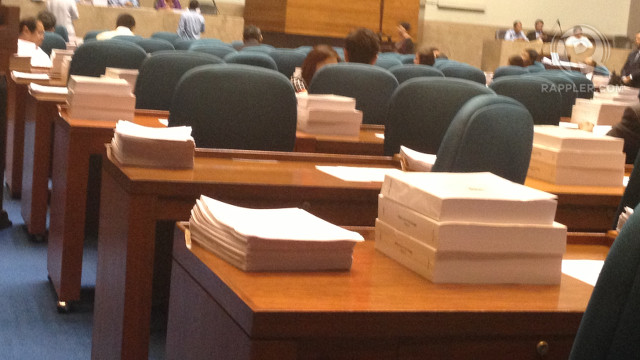SUMMARY
This is AI generated summarization, which may have errors. For context, always refer to the full article.

MANILA, Philippines (3rd UPDATE) – The bicameral conference committee approved Tuesday morning, December 10, the proposed P2.264 trillion national budget for 2014.
It only needs the ratification of the Senate and the House of Representatives before it can be transmitted to the president for his signature.
The 2014 general appropriations bill includes a P100-billion lump sum rehabilitation fund for calamity-hit areas.
Of the amount, P80 billion will be allocated for the government’s rehabilitation plans.
The remaining P20 billion will be divided among various local government units and agencies, including the Department of Social Welfare and Development, Department of Trade and Communication, Department of Public Works and Highways, Department of Health. This is separate from the P16.9 billion quick response fund distributed across different line agencies.
For the first time, the proposed appropriations law will require lump sum funds to be subjected to further line-item budgeting. Agencies will also be mandated to submit quarterly reports to be posted on the budget department’s website.
Sen Francis “Chiz” Escudero, chairman of the Senate finance committee, said agencies that will get lump sum funds in the 2014 budget, including the P80 billion unprogrammed rehabilitation fund, will be required to file a special budget that will detail how the fund will be utilized.
Tuesday’s bicam hearing was opened to the public following calls from citizens to make the deliberations more transparent in the aftermath of the pork barrel scam.
A. FY 2014 Summary of Amendments – Senate
Lawmakers banned from recommending projects after budget approval
This is the first appropriations bill without the Priority Development Assistance Fund (PDAF), earlier struck down by the Supreme Court as unconstitutional.
The Senate deleted the P3.2 billion PDAF of 15 senators and Vice President Jejomar Binay, cutting down Malacañang’s proposed budget of P2.268 trillion to P2.264 trillion.
Early in the budget process, the House of Representatives agreed to abolish the PDAF and re-align the P25.2 billion fund intended for the Priority Development Assistance Fund (PDAF) to 6 national agencies. Part of the lawmakers’ consensus was to allow them to recommend a list of scholars and patients to DOH or DepEd after the budget has been enacted.
This provision has been struck down from the general appropriations bill following the SC ruling.
“On post-enactment intervention or discretion, we deleted all incompatible provisions,” Escudero said. We found 3. “In fact, we even included a provision stating that the Supreme Court decision includes the prohibition of post-enactment intervention. That’s the definition of the Supreme Court on pork barrel – post-intervention of lawmakers.
The deleted provisions include:
- Under DepEd, DOH and DPWH – Specification that the realignment of appropriations released for projects may be undertaken not later than the third quarter of the current year.
- Under the Department of Agriculture – The phrase requiring COCAFAM’s issuance of revised implementation guidelines on the utilization of the ACEF before any releases are made under the Loan Assistance Program of the ACEF. This is due to the recent Supreme Court Ruling on the participation of the legislators after the approval of the GAB.
-
Under Congress, Judiciary, Ombudsman, Commission on Election, Commission on Audit, and Civil Service Commission – special provisions of Offices with Fiscal Autonomy, specifically on the “Funding Requirements for the Filling of Unfilled Positions” since it is against the Constitution.
Congress has managed to pass the budget on time under the Aquino administration.
Under the law, failure to pass the appropriations bill before the end of the fiscal year would mean a reenacted budget until Congress approves the bill.
In the previous Arroyo administration, the government operated on a reenacted budget for at least 4 times.
Escudero said the Senate hopes to ratify the budget Tuesday afternoon or Wednesday at the latest.
B. 2014 Senate Amendments Explanation
– Rappler.com
Add a comment
How does this make you feel?
There are no comments yet. Add your comment to start the conversation.